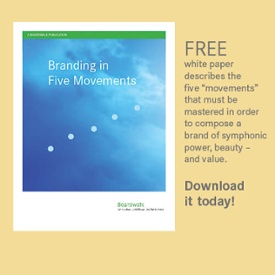 Just a buzzword. A fad. Blue sky. Unmeasurable. Unnecessary. Many, perhaps most, leaders of small- and middle-market businesses are quick to dismiss branding as a waste of resources … or worse. I accept the blame for this state of affairs. Well, maybe not full blame. But I am among the many professionals who write and speak publicly about branding. I’ve been called – and I shudder to utter these words – a branding expert. (I’m always mindful of Harry Truman’s definition of an expert: Someone who can’t ever be wrong because, if he ever is, then he ain’t an expert any more.) But I do write and speak about branding. And so do trademark attorneys, public relations professionals, graphic designers, ad men, inbound marketers, social media marketers, business coaches and countless others. And English being the mutable language it is, we all use the terms brand and branding in slightly different ways. What is a business person to think when even we so-called experts can’t agree on a definition of the thing we’re supposed to be experts on?
Just a buzzword. A fad. Blue sky. Unmeasurable. Unnecessary. Many, perhaps most, leaders of small- and middle-market businesses are quick to dismiss branding as a waste of resources … or worse. I accept the blame for this state of affairs. Well, maybe not full blame. But I am among the many professionals who write and speak publicly about branding. I’ve been called – and I shudder to utter these words – a branding expert. (I’m always mindful of Harry Truman’s definition of an expert: Someone who can’t ever be wrong because, if he ever is, then he ain’t an expert any more.) But I do write and speak about branding. And so do trademark attorneys, public relations professionals, graphic designers, ad men, inbound marketers, social media marketers, business coaches and countless others. And English being the mutable language it is, we all use the terms brand and branding in slightly different ways. What is a business person to think when even we so-called experts can’t agree on a definition of the thing we’re supposed to be experts on?
When I think about branding, I don’t think about the pejorative terms that are sometimes used to describe it. I think about innovation, strategy, positioning, design and communication. I think about all the benefits a business can reap if they brand themselves correctly. But then, I’m a brand strategist and I’ve worked on plenty of branding projects and have seen those benefits drive value in the real world. If you have never seen it for yourself, and most business people have not, you have good reason to be, at least, a little skeptical. Then the experts start talking.
When a trademark attorney speaks about branding, the focus is almost always on registering a business’s trademark with the proper authorities. Attorneys want to ensure that you, and only you, have the right to exploit your intellectual property. They want to preclude anyone else from piggybacking off your success, confusing the market and taking business that should be yours. This is an important aspect of branding. But, of course, it’s not the whole story.
When your PR person talks about branding, the real topic is likely reputation management. This is the Jeff Bezos definition of brand, “Your brand is what people say about you when you’re not in the room.” BTW, Jeff. People are not saying nice things about you. Again, there’s a lot of truth in this definition of branding. But, one more time, it’s not the whole story.
I got my start in branding through graphic design. When designers speak about branding it’s all about logos and visual identity systems. Applications, font families and color palettes. It’s about integrating a singular visual style into every conceivable market touch point. Still not the whole story.
And now there are new experts talking about branded content, branded entertainment, branded blank and the like. So, with all us experts placing emphasis on different aspects of branding, the truth quickly becomes evident …
There is no universally accepted definition of brand.
We all just go with our own definitions, informed by our own experience and our own innovations. And, sorry, but that’s just confusing. It’s no wonder business people filter out us branding experts. People are always trying to sell them stuff anyway. Why open the door to someone who’s selling something you don’t fully understand? Business people are to be forgiven for thinking twice before dropping any coin into a branding initiative.
So, business people, here’s how to take the mystery out of branding. Here’s how you should think about your brand. Your brand is the relationship your marketable asset shares with its market. Emphasis on share. Your market owns your brand as much as you do. You can tell that from reading Yelp reviews. You can tell that from the way markets can force businesses to change their behavior. Boil it down to these six words: A brand is a promise kept. Make that your mantra.
Step 1 – You have to understand your true brand promise (strategy).
Step 2 – You have to make your brand promise consistently (marketing).
Step 3 – Finally, you have to keep your brand promise (operations).
It takes every department, every employee working together to build a great brand. Do that, and you market will reward you with brand loyalty. And, the longer you can keep this covenant, the stronger and more valuable your brand will grow.
And you’ll no longer be skeptical.
Best Branding Reads – Week of November 18, 2019
318 brands celebrate victory at World Branding Awards 2019
From the "They’ll Give Awards Out For Anything" file. Somebody put a helluva lot of work into this.
Integrating Brand Strategy And Positive Psychology
Any time you sell something to your customer, package it with a unique psychological benefit – baksheesh.
How to Leverage Visual Branding to Drive Authenticity in Marketing
Get the visuals right. In an instant, they tell the whole story about your brand before your customer reads a single word.
The Risks And Rewards Of Brand Extension
It’s risky to extend a brand but there’s risk in being complacent too. Read your market well.
Meet Arrokoth: Ultima Thule, the Most Distant Object Ever Explored, Has a New Name
From the “They’ll Rebrand Anything” file. Arrokoth is OK but I really liked Ultima Thule. Who decided to rename it and why?
New Logo and Identity for Warner Bros.
Beautifully done. But surprisingly conservative for an entertainment company.
The Business Owners' Essential Guide to Brand Protection
My friend, IP attorney Cheryl Hodgson, wrote a terrific book! Get your complimentary copy here.



